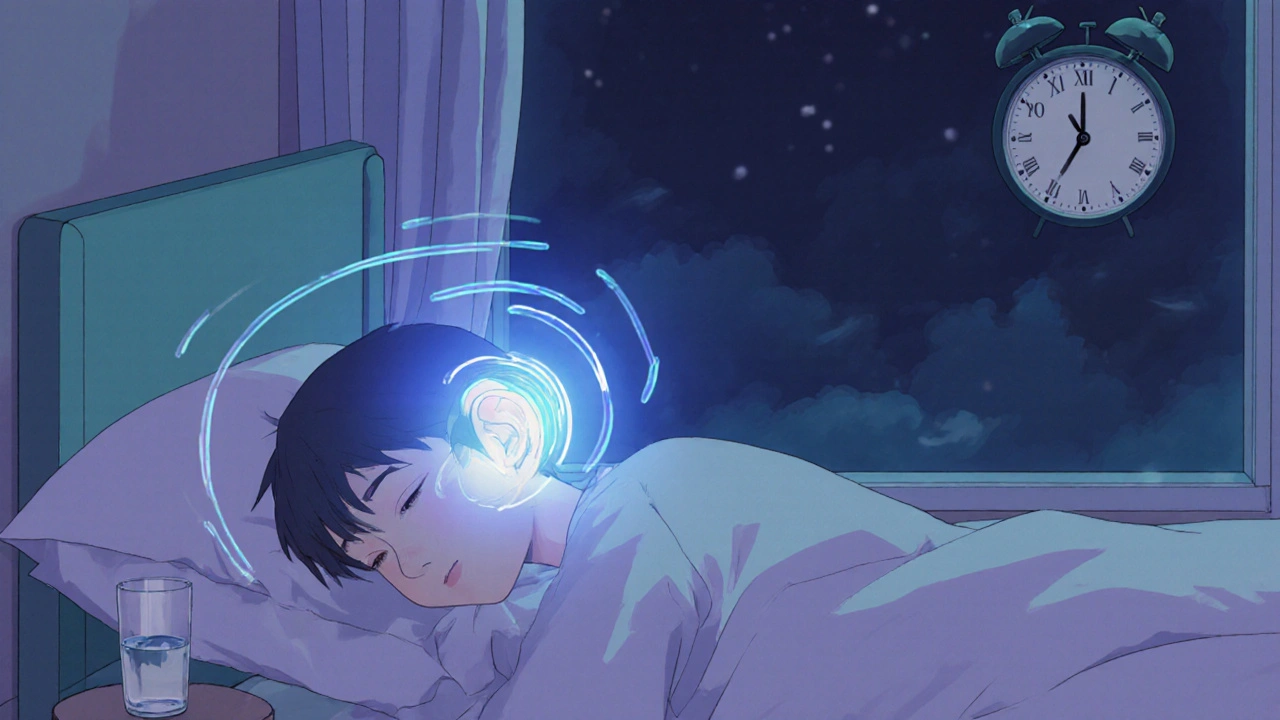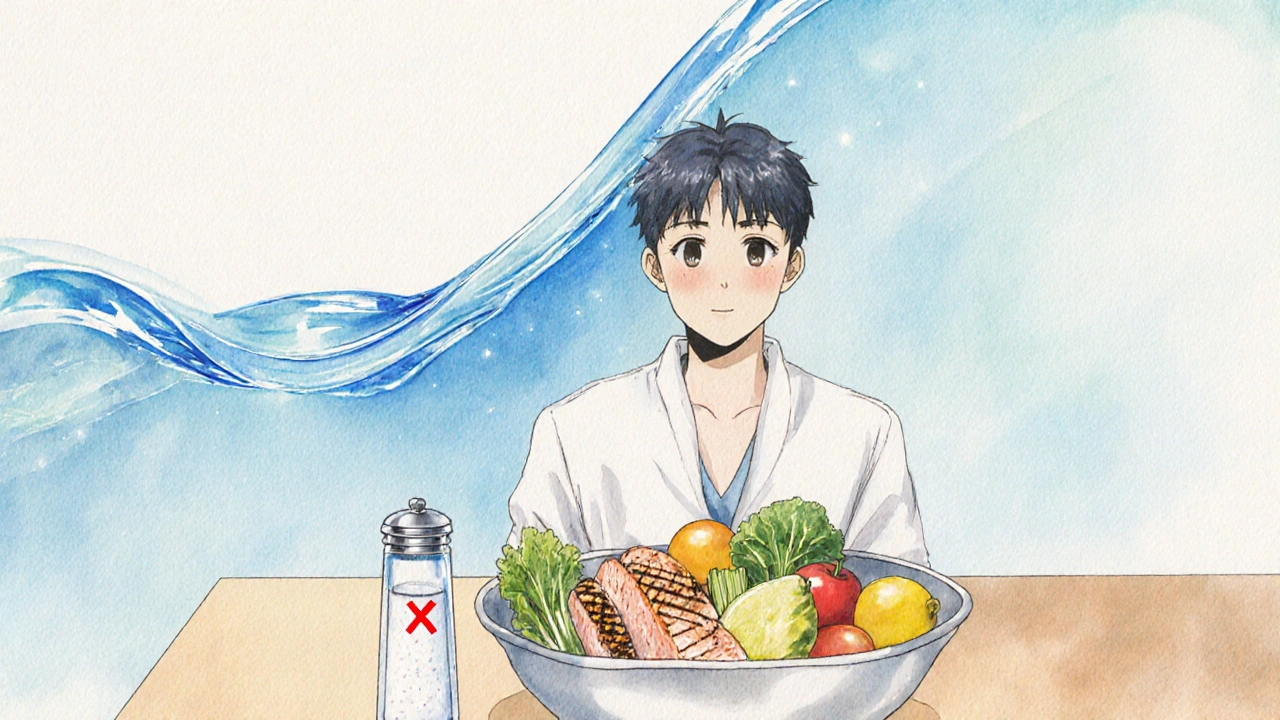When you’re hit with sudden dizziness, ringing in your ears, and that heavy, full feeling like your head’s underwater, it’s not just annoying-it’s terrifying. For people with Meniere’s disease, these episodes don’t come and go quietly. They wreck your day, your balance, your hearing, and sometimes your confidence. And while medications and injections are options, the most powerful, least risky tool you have is already in your kitchen: your diet.
Why Salt Is the Hidden Trigger
Meniere’s disease isn’t caused by something you caught or ate. It’s a mystery of the inner ear, where fluid called endolymph builds up too much, putting pressure on delicate structures that control hearing and balance. That pressure is what causes vertigo, muffled hearing, and the constant buzz of tinnitus. For decades, doctors noticed something odd: when patients ate more salt, their symptoms got worse. Salt pulls water into your bloodstream, and your body holds onto that extra fluid. In someone with Meniere’s, that fluid doesn’t just stay in the bloodstream-it leaks into the inner ear, swelling the endolymph and making symptoms flare. Research from 2024 in Acta Otolaryngologica showed that cutting sodium to 1,500 mg per day, while drinking the right amount of water, led to measurable improvements:- Average hearing improved by 12.3 dB at key frequencies
- Vertigo attacks dropped in frequency and intensity
- Tinnitus scores fell by nearly half
- Dizziness scores dropped from 62 to 29 on a standard scale
How Much Sodium Is Too Much?
You don’t need to become a nutritionist to get this right. The target is simple:- 1,500 mg per day is the ideal goal for most people with Meniere’s
- 2,000 mg per day is the upper limit if 1,500 feels too strict
- One slice of bread: 150-230 mg
- A cup of canned soup: 800-1,200 mg
- A fast food burger: 1,000-1,500 mg
- One tablespoon of soy sauce: 1,000 mg
What to Eat (and What to Avoid)
The goal isn’t to eat bland food. It’s to eat real food.Do Eat:
- Fresh fruits and vegetables
- Unprocessed meats, poultry, and fish (not cured or brined)
- Whole grains like brown rice, quinoa, oats
- Low-sodium dairy (unsalted butter, plain yogurt, fresh cheese)
- Herbs and spices: garlic, ginger, rosemary, cumin, chili powder
- Water-35 ml per kilogram of body weight daily (about 2.5 liters for a 70kg person)
Avoid:
- Salt shakers and table salt
- Processed snacks: chips, pretzels, crackers
- Canned soups, sauces, and broths (unless labeled “low sodium”)
- Soy sauce, Worcestershire sauce, ketchup, mustard, relish
- Fast food and restaurant meals (they’re loaded with hidden salt)
- Pickled, cured, or smoked foods: bacon, ham, salami, olives, pickles
- Pre-packaged meals: frozen dinners, instant noodles, boxed pasta

Hydration Isn’t About Drinking More Water-It’s About Drinking the Right Amount
You might think, “If salt holds water, shouldn’t I drink less?” No. That’s a common mistake. Drinking too little water makes your body hold onto even more fluid as a survival tactic. That makes Meniere’s worse. The 2024 study found that drinking 35 ml per kilogram of body weight each day was the sweet spot. For most adults, that’s about 2.5 to 3 liters. Spread it out. Don’t chug it all at once. Sip water steadily from morning to evening. And skip the dehydrators: caffeine and alcohol. Both constrict blood vessels in the inner ear, which can trigger attacks. That means coffee, tea, soda, energy drinks, wine, beer, and spirits should be limited or avoided.How to Stick to It (Without Going Crazy)
This isn’t a 2-week diet. It’s a lifestyle. And it’s hard. Here’s how real people do it:- Read labels like your hearing depends on it-because it does. Look for “sodium” on the nutrition facts. Aim for under 140 mg per serving.
- Shop the perimeter of the grocery store-that’s where fresh food lives. Avoid the center aisles with packaged goods.
- Make your own meals-even simple ones. Roast chicken with herbs, steam veggies, cook rice. You control the salt.
- Ask for no salt when eating out-most restaurants will do it if you ask. Say, “I have a medical condition-I need food with no added salt.”
- Use salt substitutes wisely-some contain potassium chloride, which is fine for most people, but check with your doctor if you have kidney issues.
- Keep a food journal-track what you eat and how you feel. Patterns emerge fast.

What About Medications and Other Treatments?
Diet isn’t the only tool. Diuretics like hydrochlorothiazide are often prescribed to flush out fluid. But they come with side effects: dizziness, low potassium, dehydration, even kidney stones. In contrast, a low-sodium diet has no side effects-just benefits. A 2018 study found that 68% of patients saw major improvement with sodium restriction alone. No pills. No shots. If diet doesn’t help enough, other options exist: steroid injections into the ear (60-75% effective), or gentamicin injections (80-90% effective at stopping vertigo, but risky for hearing). But these are last resorts. Diet comes first.The Bottom Line
Meniere’s disease doesn’t have a cure. But it has a manageable path. And it starts with what’s on your plate. You don’t need to be perfect. You don’t need to eat kale every day. You just need to cut the hidden salt, drink enough water, avoid caffeine and alcohol, and stick with it. The 2024 study proves it: real, measurable improvements happen when you get the sodium and fluid balance right. Your hearing gets clearer. Your vertigo slows down. Your tinnitus quiets. You start sleeping better. You stop dreading the next attack. It’s not magic. It’s physiology. And it’s yours to control.Can I still eat out if I have Meniere’s disease?
Yes, but you need to be strategic. Ask for meals prepared without added salt, avoid sauces and dressings, skip appetizers like chips or fried foods, and choose grilled or steamed proteins with plain vegetables and rice. Most restaurants will accommodate if you explain you have a medical condition requiring low sodium.
How long does it take to see results from a low-sodium diet?
Some people notice less dizziness within a few weeks. For hearing and tinnitus improvements, it often takes 2-6 months of consistent low-sodium eating. The 2024 study showed clear results after 6 months, so patience and consistency matter.
Is it safe to cut sodium to 1,500 mg per day?
Yes, for most people. The American Heart Association recommends 1,500 mg daily for heart health. Unless you have kidney disease, heart failure, or are on certain medications, this level is safe and healthy. Always check with your doctor if you’re unsure.
What if I crave salty food?
Cravings fade. Your taste buds reset in 2-4 weeks. In the meantime, use lemon juice, vinegar, garlic, herbs, and spices to add flavor. Try roasted nuts, unsalted popcorn, or fresh fruit. Avoid salt substitutes with potassium if you have kidney problems.
Do I need to avoid all dairy?
No. Avoid processed cheeses, salted butter, and flavored yogurts. Stick to plain, unsalted dairy: fresh mozzarella, plain Greek yogurt, unsalted butter, and milk. Check labels-some milk brands add sodium. Choose ones with less than 50 mg per serving.
Can children with Meniere’s follow this diet?
Meniere’s is rare in children, but if diagnosed, a low-sodium diet can be adapted under medical supervision. Focus on whole foods, avoid processed snacks, and work with a pediatric dietitian to ensure proper growth and nutrition.
Will this diet help with balance problems outside of Meniere’s attacks?
Yes. Reducing inner ear fluid pressure can improve baseline balance and reduce the feeling of unsteadiness between attacks. Many patients report feeling more stable overall, not just during flare-ups.


Comments
Shawn Daughhetee
Just tried this for 3 weeks-no more midday vertigo spikes. I used to need to sit down after walking to the fridge. Now I can grocery shop without sweating. No meds. Just less salt and more water. Game changer.
On November 23, 2025 AT 01:03
Julie Pulvino
I used to think this was just hype until my audiologist said my hearing thresholds improved after 4 months. It’s not sexy, but it’s real. I cook everything from scratch now-even my own broth. Worth every extra minute.
On November 23, 2025 AT 01:18
Mark Williams
The 35ml/kg hydration metric is critical. Most people think ‘drink more’ means chugging at night, but that disrupts circadian osmotic regulation. The key is steady-state tonicity-constant low-volume intake throughout daylight hours. This aligns with inner ear endolymphatic homeostasis mechanisms. Don’t flood. Sustain.
On November 23, 2025 AT 05:59
Ravi Kumar Gupta
In India we use rock salt and lemon with black salt in chutneys-way better than soy sauce or MSG. I swapped all packaged snacks for roasted chickpeas with cumin and chili. No more dizziness. My uncle’s been doing this for 8 years. He still plays cricket at 67.
On November 24, 2025 AT 08:18
Holly Schumacher
Let’s be clear: if you’re still eating canned soup, you’re not trying. You’re just pretending. The fact that you think ‘low-sodium’ labels are a free pass means you don’t understand the chemistry. 140mg per serving? That’s not low-it’s a trap. Read the ingredient list. If it says ‘monosodium glutamate’ or ‘sodium benzoate,’ you’re still poisoning yourself. Wake up.
On November 25, 2025 AT 04:43
Latonya Elarms-Radford
It’s not just a diet-it’s a spiritual recalibration. The inner ear is the seat of our equilibrium, yes, but also our soul’s connection to gravity. When we flood it with sodium, we’re not just disrupting physiology-we’re severing our ancestral pact with the earth’s natural rhythms. Salt was once sacred. Now it’s a weapon of industrialized despair. I weep for the generation that thinks ‘no salt’ means ‘no flavor.’ Flavor is in the rosemary. In the lemon zest. In the silence between heartbeats.
On November 27, 2025 AT 03:22
Michael Fitzpatrick
Look, I’m not a doctor, but I’ve had this for 12 years. I tried every pill, every injection, every weird supplement. Nothing stuck. Then I just stopped eating anything that came in a box or a bag. I started walking every morning with a water bottle. Didn’t change my life overnight-but after 6 months, I could finally hear my daughter’s voice without it sounding like she was underwater. That’s worth it. Keep going.
On November 27, 2025 AT 05:30
Patrick Marsh
1,500mg is achievable. Read labels. Avoid processed cheese. Drink water. That’s it.
On November 27, 2025 AT 15:12
Rahul Kanakarajan
Why are you all acting like this is some breakthrough? I’ve been telling people for years that salt causes vertigo. You think you’re special because you read a study? Go outside. Talk to someone who’s not American. In my village, we’ve always known salt is poison. Your ‘science’ is just catching up to common sense.
On November 28, 2025 AT 23:28
luke young
Just wanted to say-this thread helped me. I was about to give up. Now I’m meal prepping with my mom. We’re doing lemon-garlic salmon and quinoa. No salt. Just flavor. She says I’m turning into a food nerd. I say I’m turning into a person who can stand up without spinning. Worth it.
On November 30, 2025 AT 15:30
New Yorkers
You people are so naive. You think diet fixes everything? What about the stress? The trauma? The repressed emotions stored in the vestibular system? You’re treating symptoms like they’re the disease. This isn’t about sodium-it’s about the collapse of modern civilization’s relationship with the body. You’re all just trying to control the symptom while the root rot spreads.
On November 30, 2025 AT 17:26
Danny Nicholls
just started this last week and already my ears feel lighter 😊 i used to need 3 naps a day now i’m actually awake during dinner 🙌 also made my own salsa with no salt-tastes like freedom
On December 1, 2025 AT 15:42
james lucas
im not gonna lie i thought this was gonna be impossible but i swapped out my usual ramen for lentils with smoked paprika and its kinda fun now? like a game. also my dog started staring at me like im a wizard when i eat my ‘boring’ food. weird but cool
On December 2, 2025 AT 07:53
David Cunningham
Been doing this for 9 months. My tinnitus dropped from a constant 8/10 to a faint 2/10. I still have bad days, but now I know it’s not the end of the world. I cook with herbs, drink water, and say no to takeout. Simple. Not glamorous. But it works. Australia doesn’t have great low-sodium options, but you adapt. You find a way.
On December 2, 2025 AT 23:13